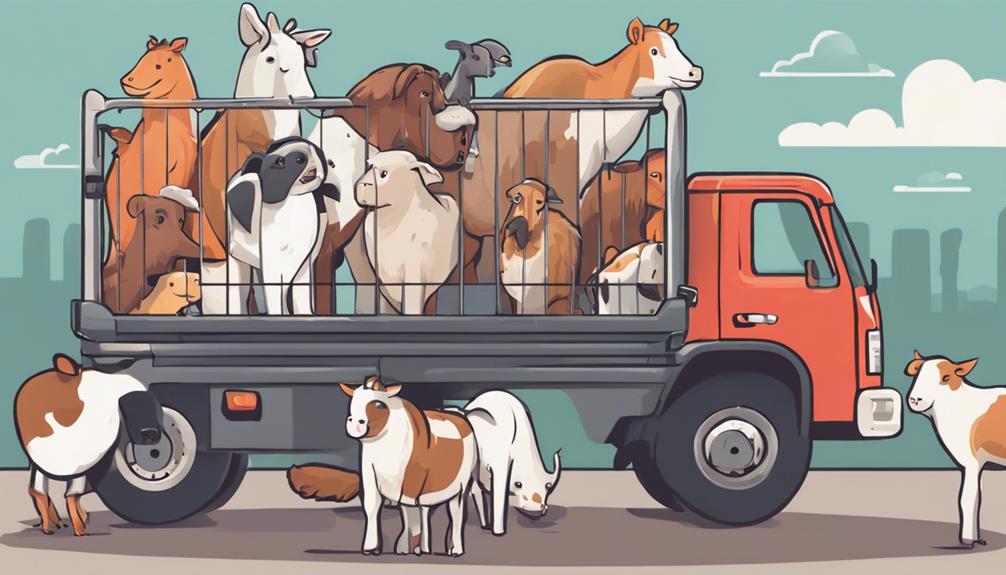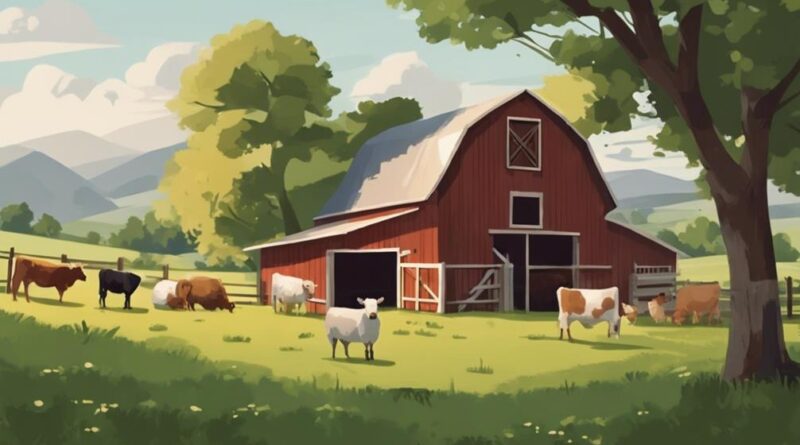Beginner's Guide to Sustainable Livestock Farming Practices
As you step into the world of sustainable livestock farming, imagine it as a harmonious dance between nature and nurture. The choices you make today can ripple into a greener tomorrow, but where do you begin?
From selecting the right breeds to nurturing healthy soil, each decision plays a crucial role in the sustainability of your farm.
So, are you ready to take the first step towards a more eco-conscious and fulfilling farming journey?
Setting Up Your Organic Farm
When starting your organic farm, begin by selecting a suitable piece of land that receives ample sunlight and has access to water sources. Proper soil management is crucial for the success of your crops. Implementing techniques like crop rotation can help maintain soil fertility and reduce the risk of pests and diseases. By rotating crops seasonally, you can optimize the use of nutrients in the soil and prevent depletion.
Water conservation is another essential aspect to consider. Setting up efficient irrigation systems can help you maximize water usage while minimizing waste. Drip irrigation, for example, delivers water directly to the roots of plants, reducing evaporation and runoff. This method not only conserves water but also promotes healthier plant growth by ensuring each plant receives an adequate amount of water.
When planning your organic farm, take into account the layout of your crops to optimize sunlight exposure and water distribution. Grouping plants with similar water needs together can help streamline your irrigation efforts. Additionally, consider incorporating cover crops to protect the soil, enhance nutrient levels, and prevent erosion.
Choosing the Right Livestock
To ensure the success of your organic farm, selecting the right livestock plays a crucial role in maintaining sustainability and productivity. When choosing the right livestock for your sustainable farm, consider the following key factors:
- Breeds selection: Opt for livestock breeds that are well-suited to your specific climate and farming conditions. Certain breeds may be more resistant to local diseases or thrive better on pasture-based systems.
- Health management: Prioritize the health and well-being of your livestock by implementing effective health management practices. Regular veterinary check-ups, vaccination schedules, and proper hygiene measures are essential in preventing disease outbreaks.
- Genetic traits: Select livestock breeds with desirable genetic traits such as high fertility rates, efficient feed conversion, and good temperament. These traits can positively impact your farm's overall productivity and sustainability.
- Adaptability: Choose livestock species that can adapt well to your farming practices and available resources. Consider factors like feed availability, water supply, and the overall environmental impact of raising a particular species on your farm.
Providing Nutritious Organic Feed
Consider sourcing high-quality organic feed to ensure the optimal nutrition of your livestock for sustainable farming practices. By prioritizing organic feed, you not only provide essential nutrients to your animals but also contribute to maintaining soil fertility. Organic feed is free from synthetic additives, pesticides, and genetically modified organisms, which can positively impact the overall health and well-being of your livestock.
To further enhance the nutritional value of your organic feed, implementing crop rotation can be beneficial. Crop rotation involves planting a variety of crops in a specific sequence on the same piece of land over time. This practice helps maintain soil fertility by reducing disease pressure and pests, improving soil structure, and promoting natural nutrient cycling. As a result, the crops grown in such soil tend to be more nutritious, leading to higher-quality organic feed for your livestock.
Implementing Natural Health Practices
Prioritize incorporating holistic healthcare methods for your livestock to ensure their well-being and sustainability on your farm. By embracing natural health practices, you can enhance the overall health and resilience of your animals while reducing the need for synthetic medications.
Here are some essential tips to implement herbal remedies and holistic care for your livestock:
- Herbal Remedies: Integrate herbal remedies into your livestock healthcare routine to promote natural healing and boost immunity. Herbs like garlic, oregano, and chamomile have known health benefits for various livestock species.
- Regular Health Assessments: Conduct regular health assessments to monitor the well-being of your animals. This proactive approach allows you to identify any potential health issues early on and take appropriate action.
- Stress Reduction Techniques: Implement stress reduction techniques such as providing adequate space, environmental enrichment, and a low-stress handling system. Minimizing stress can significantly improve the overall health and productivity of your livestock.
- Consult with Holistic Veterinarians: Work closely with veterinarians who specialize in holistic care to develop personalized healthcare plans for your livestock. These professionals can provide valuable insights and guidance on natural health practices tailored to your farm's needs.
Creating Sustainable Housing
When designing sustainable housing for your livestock, focus on incorporating eco-friendly materials and efficient space utilization. Green construction practices can include using recycled or reclaimed materials, installing energy-efficient lighting and ventilation systems, and utilizing natural insulation materials like straw or clay. These choices not only benefit the environment but also create a healthier living space for your animals.
Consider implementing eco-friendly design elements such as solar panels for renewable energy, rainwater collection systems for water conservation, and green roofs to improve insulation and reduce stormwater runoff. By prioritizing sustainability in your housing structures, you can lower operational costs and lessen your farm's overall environmental impact.
Efficient space utilization is crucial in sustainable housing. Design your livestock shelters to maximize natural light and ventilation, reducing the need for artificial heating and cooling. Proper layout and organization can also help streamline daily tasks and improve the overall well-being of your animals.
When constructing or renovating livestock housing, always keep the principles of green construction and eco-friendly design at the forefront. By making conscious choices about materials, energy usage, and space management, you can create a more sustainable and efficient living environment for your livestock.
Managing Grazing and Pasture
To enhance sustainability on your livestock farm, focus on effectively managing grazing and pasture. Implementing proper grazing techniques not only benefits your livestock but also promotes the health of your pastures and soil. Here are some key points to consider:
- Rotational Grazing: Utilize rotational grazing practices to divide your pasture into smaller sections. By rotating livestock between these sections, you allow the vegetation in other areas to recover. This helps prevent overgrazing, promotes regrowth, and maintains pasture health.
- Soil Health: Healthy soil is essential for sustainable livestock farming. Proper grazing management can improve soil health by reducing soil compaction, increasing organic matter content, and enhancing nutrient cycling. Consider soil testing and implementing practices like composting to enrich your soil.
- Pasture Management: Effective pasture management involves regular monitoring of pasture conditions, including grass height, weed presence, and overall forage quality. Adjust stocking rates and grazing periods based on pasture health to prevent degradation and promote longevity.
- Biodiversity: Encouraging biodiversity in your pastures can lead to a more resilient ecosystem. Diverse plant species support a variety of wildlife, enhance soil structure, and increase nutrient availability. Aim to create a balanced ecosystem that benefits both your livestock and the environment.
Ensuring Ethical Handling and Transport

Enhance the welfare of your livestock and uphold ethical standards by implementing best practices for handling and transporting them responsibly. Adhering to transport regulations is crucial for ensuring animal welfare during transit. Familiarize yourself with local and national laws governing the transportation of livestock to guarantee humane handling and care throughout the journey. Prioritize stress reduction strategies to minimize the negative impact of transportation on your animals.
When preparing your livestock for transport, consider their comfort and safety. Ensure that the vehicles used are well-maintained, clean, and properly ventilated. Avoid overcrowding to prevent unnecessary stress and injuries during transportation. Implement practices that promote gentle handling to create a calm environment for your animals. Proper training of personnel involved in loading and unloading can significantly reduce the risk of accidents and distress.
Regularly inspect and maintain your transportation equipment to meet safety standards and prevent any potential harm to your livestock. Monitor environmental conditions such as temperature and humidity to address any concerns that may arise during transport. By prioritizing the well-being of your animals and complying with ethical handling practices, you not only ensure their welfare but also maintain the quality and integrity of your livestock farming operation.
Marketing Your Organic Products
Marketing your organic products involves strategically showcasing the unique benefits of your sustainable livestock farming practices to attract environmentally conscious consumers. To effectively promote your products, consider the following strategies:
- Online Promotions: Utilize social media platforms and your website to highlight the organic nature of your livestock products. Engage with your audience by sharing behind-the-scenes glimpses of your farm and the processes that make your products sustainable.
- Local Events: Participate in farmers' markets, organic food fairs, and community events to connect directly with potential customers. These interactions provide an opportunity to educate people about the benefits of choosing organic products from your farm.
- Social Media: Leverage the power of social media to reach a broader audience. Regularly post about your products, farming techniques, and any certifications or awards your farm has received. Engaging content can attract followers who value sustainability.
- Influencer Partnerships: Collaborate with influencers or bloggers who align with your values and target market. Influencers can help amplify your message and introduce your products to their followers, expanding your reach within the eco-conscious community.
Frequently Asked Questions
How Can Sustainable Livestock Farming Practices Help Combat Climate Change?
To combat climate change, sustainable livestock farming practices play a crucial role. By focusing on sustainable grazing and pasture management, you can help reduce livestock emissions significantly.
Additionally, these practices promote carbon sequestration, capturing and storing carbon from the atmosphere in the soil.
What Are Some Common Challenges Faced by Beginner Organic Farmers in Sustainable Livestock Farming?
When starting out in sustainable livestock farming, you may face common challenges like limited knowledge, high initial costs, and marketing difficulties.
To overcome these obstacles, consider seeking mentorship from experienced farmers, starting small to manage expenses, and building a strong online presence for marketing.
How Can Sustainable Livestock Farming Practices Benefit the Local Ecosystem?
By implementing sustainable livestock farming practices, you can benefit the local ecosystem in various ways. Biodiversity conservation is promoted, ensuring a healthy balance of species.
Soil fertility is enhanced through natural methods, improving crop growth.
Water management techniques help in conserving this vital resource.
Carbon sequestration occurs, reducing greenhouse gas emissions and combating climate change.
Are There Any Government Regulations or Certifications That Beginner Organic Farmers Should Be Aware Of?
When starting out in organic farming, it's essential to understand government regulations and certification requirements. These guidelines ensure that your farm meets specific standards for sustainability and animal welfare.
Familiarize yourself with programs like USDA Organic Certification and local agricultural rules. By complying with these regulations, you not only contribute to a healthier environment but also gain credibility with consumers seeking ethically produced goods.
Stay informed and stay compliant to succeed in sustainable farming.
How Can Beginner Organic Farmers Ensure the Welfare and Well-Being of Their Livestock While Practicing Sustainable Farming Methods?
To ensure the welfare and well-being of your livestock while practicing sustainable farming methods, focus on animal welfare and ethical practices. Implement grazing management techniques and pasture rotation to provide your animals with access to fresh forage and prevent overgrazing.
Regularly assess your livestock's health and living conditions, ensuring they've space to move and express natural behaviors. By prioritizing animal welfare, you can create a sustainable and ethical farming environment for your livestock.
Conclusion
Overall, sustainable livestock farming practices require careful planning and dedication to organic principles.
By setting up your farm thoughtfully, choosing the right livestock, providing nutritious feed, implementing natural health practices, creating sustainable housing, managing grazing and pasture effectively, ensuring ethical handling and transport, and marketing your organic products, you can contribute to a healthier environment and provide high-quality, sustainable products for consumers.
Keep up the good work and continue striving for sustainability in your farming practices.
